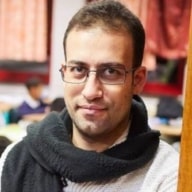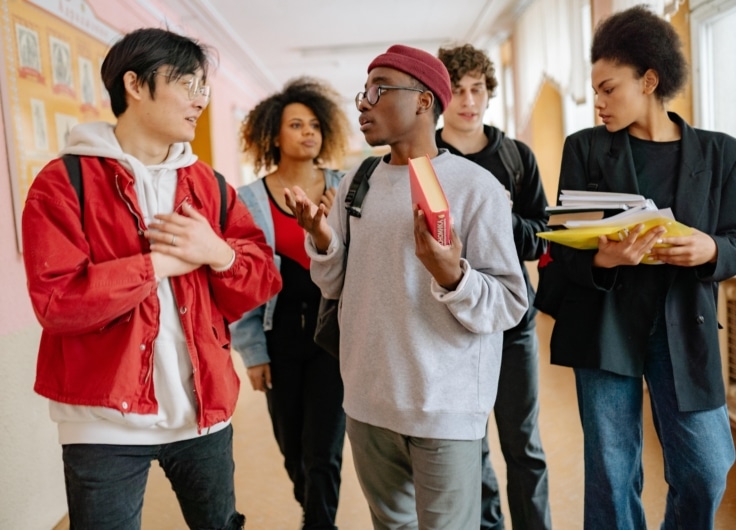When the Mother Tongue Erodes: On the Importance of Multilingualism Among Newcomers
Children who have emigrated from Syria to Belgium in recent years quickly learn the language of their new home country. Of course that’s beneficial, but it also leads to the loss of their mother tongue and to conflicting feelings about their identity. There is a growing communication gap between these children and their parents, and that’s not without its consequences. How can the chinks in their languages be closed? This is Zahra’s story, told by her Arabic teacher in Brussels.
For the fourth week in a row, little Zahra has walked out of her Arabic class. I decide to call her mother, and ask her to come and collect the little girl. A while later she enters the bare classroom, blushing with embarrassment. She smiles apologetically and sits down next to her daughter, to whom she hastily whispers her admonitions.
“I don’t really understand it,” the woman admits hesitantly, in a typical Damascus accent. “We always speak Arabic at home, it’s her mother tongue. Why doesn’t she want to attend Arabic school at the weekend?”
“Don’t worry, Madame,” I try to reassure her. I turn to little Zahra, who is staring ahead dejectedly. She’s just turned nine and is holding her book bag firmly pressed against her.
“Zahra? Why did you walk out?” I ask, in Dutch this time.
“I don’t want to learn Arabic,” she says cautiously.
“Why not?”
“Because I live here. I’m Belgian.”
Then her mother smiles. Softening, she strokes Zahra’s shiny hair. “She learnt Dutch very quickly,” she nods proudly at me. “You know, even at home she often speaks Dutch. I ask in Arabic how her day was, and she replies in Dutch. I can understand it, more or less.”
Erosion
Zahra is not alone in her confusion. Every day Syrian children in Belgium feel their mother tongue slipping away. They are strongly encouraged to speak Dutch (or French) and are remarkably successful at that. It’s an achievement that delights their parents. The fact that their children are less and less fluent in Arabic is something they can put up with.
Such erosion of the mother tongue is certainly a natural consequence of migration. Language attrition is the term used in linguistics for this phenomenon: the erosion of a person’s language in favour of a second. Children with a recent migration background are strongly encouraged to build their skills as far as possible in the language spoken around them, at sports clubs, in the street, in maths and history lessons. They explore many registers and steadily expand their vocabulary. The mother tongue, in contrast, is limited to domestic use.
 Arabic lessons in Brussels.
Arabic lessons in Brussels.Ⓒ VUB - ALEF Project
The language of school, the doctor and the labour market soon seems more influential and therefore more important than the dialect spoken at home. For Syrian children and young people this perception is all the more pervasive, as in contrast with their Lebanese and Moroccan classmates they never visit their family in their home country. Since a return currently seems out of the question, Syrian parents drill it into their children even more strenuously that they should attain a perfect command of Dutch. The discovery that one language is stronger than another is absorbed into their world view very early on. Sometimes children refuse to speak Arabic with their parents, particularly in the shop, at school or at the dentist. In short, in the Dutch-speaking external world.
Arabic class
During the weekends, however, these children, like Zahra and her classmates, are made to attend our school. Every Wednesday, Saturday and Sunday the Vrije Universiteit Brussel (VUB) organises after-school classes in Arabic for children. Since 2016 I have been coordinating the project in four schools in Brussels – my background as a physics teacher in Syria stands me in good stead. Muslim families in particular show an interest in this option – they want their children to be able to read the Koran in Arabic. But Syrians of other religious backgrounds also want their children to be able to read and write their home language. Our school has three hundred students and a long waiting list. Around 10 percent of these children were born in Syria and moved as a result of the war.
Their parents, who go to great lengths to lead a completely ordinary life in Europe, are confronted with new symptoms of what we Syrians have long come to recognise as “Syria-phobia”, the fear of a population that finds itself locked in, in a ruined country. In Syria every citizen fears that he or she will never escape decline, that the future will be just like the present. “A country without promises, a country without return”, in the words of the Syrian poet Adonis, who has spent more time in exile than his readers can remember.
Syria-phobia has taken on new forms among the Syrian diaspora in European communities
Among the diaspora this “Syria-phobia” has taken on new forms. In European communities the label “Syrian” is linked with a murky underworld of poverty-stricken refugees, pushy beggars and radicalised jihadists. A term like Syriëstrijder (“Syria fighter”) taints an entire people. The catch-all term, coined by the Flemish media, should be viewed as an unfortunate idiom. The English “foreign fighter” or French djihadiste étranger, for instance, do not have the stigmatising side effects.
Group mentality
Refugee or Syriëstrijder – parents would prefer to spare their children such an ordeal. They no longer tell them they are Syrian, but reward their talent for language and integration (“You speak as fluently as your Flemish classmates!”). Meanwhile they search for an alternative story, so that their shared family identity is not too badly eroded. In the debris of a forgotten fatherland, religion and ethnicity are making a successful comeback. Be it Kurdish, Assyrian, Aramaic, Muslim or Christian – the group mentality is stirred up everywhere.
Naturally that has an influence on children such as Zahra. Sometimes I wonder how this girl will develop further. Her rebellion probably won’t die down. On the contrary, around the time she turns twelve, her world will grow, increasing the gulf between her home language and that of her surroundings. I often see it happen in our community. The parents, who generally have A2-level Dutch, can no longer follow what is taught at school or what is discussed at sports clubs.
The home language seems hopelessly unsuited to mapping out subjects outside the home realm. Neither parents nor young teenagers can close the chinks between their languages. Taboos thus remain unmentionable. In Great Britain the (German) researcher Sabine Little showed how difficult multilingual families find it to have deep conversations. There seems to be no shared, sufficiently refined language to talk about sensitive subjects, such as religion, life’s big questions, sexuality, but also – and importantly – feelings of unease and shame around language and identity.
The home language seems hopelessly unsuited to mapping out subjects outside the home realm
At that moment the first cracks in understanding between parents and children threaten to open. For example, when Zahra learns about evolutionary theory at school and wants to ask her parents about their view of the world, she will only be able to name and explain the issue in Dutch. Parents remain speechless, perhaps even react angrily in order to conceal their vulnerability. Thus the linguistic rift between parents and their children grows.
Add to that the fact that teenagers go in search of their own identity. The battle for distinction, even polarisation, grows during adolescence. Perhaps for that reason Zahra will mainly spend time with friends who belong to the same group: Kurdish, Christian, Muslim – the social identity assigned to them by parents who no longer want to feel Syrian.
Fundamental uncertainty
Anyone who has to grope blindly in a language feels vulnerable, particularly when it comes to the language in which you were rocked to sleep as a baby, in which you stammered your first words and in which you phone your grandparents. That feeling of alienation cannot simply be restored. Moreover Syrian children have few positive feelings handed down to them about their language. That stems from power relationships – the impression that Dutch is superior to their Arabic colloquial language. But the feelings of confusion and shame, the Syria-phobia their parents struggle with, also contribute. When children no longer feel at home in their home language and thus lose a sense of profound contact with their parents, they are alone with their questions. It is the beginning of a fundamental feeling of uncertainty.
Like everyone, during her turbulent puberty Zahra will sometimes fail an exam, have to leave a troublesome holiday job, or experience difficulties in making new contacts. The feeling of rejection can then migrate from the individual to the social level. The experience of socio-economic disadvantage, injustice and discrimination catapult the feeling of threat sky high. Our group is being drummed into a corner, the battle cry claims – whoever the group may be, in the sectarian fragmentation we call Syria.
Sometimes I imagine that in a few years Zahra will want to travel to “her” country, Syria, where she hopes no longer to belong to a minority group that she perceives to be threatened and sabotaged. She may dream of building a new country, on a religious or nationalist template. At that moment parents, grandparents and family in Syria or elsewhere in the world offer a sounding board – there is no language in which doubts can be shared. Thought is slowly fenced in.
Multilingualism
In recent years a great deal has been written about this kind of group think, which in extreme cases can lead to radicalisation. Psychologists and sociologists have made their analyses, but little has been said on the role of language and language loss. That strikes me as an omission. A thorough development of multilingualism, both the written and spoken registers, can substantially mitigate the distressing feelings of threat and alienation.
A thorough development of multilingualism can substantially mitigate the distressing feelings of threat and alienation
Fostering multilingualism allows for countless conversations, across generations and borders. Insecure teenagers can exchange views, on politics and religion, with grandparents, aunts, cousins and former classmates now in a different part of the world, as well as with writers, journalists and poets from Europe and the Arab world. Half a century ago the American writer James Baldwin claimed that literature and art might be the best answer to the tribal inclination to close rank. “You think your pain and your heartbreak are unprecedented in the history of the world,” he wrote, “but then you read.”
Pleasure and pride
How can we make Syrian children feel warm and secure in Dutch and Arabic, so that both can feel unproblematically and simultaneously like “home”? At our school we try to answer this question. We started in 2016, and are still learning every day. Our Arabic classes are inspired by a multitude of language acquisition methodologies, such as the total physical response didactics of linguist James Asher. A language is not only learnt cognitively, Asher claims, but also by the body. The right cerebral hemisphere, responsible for movement, creativity and emotion, must play a role in order for language acquisition to succeed. In our classes we therefore cheerfully drive, dance and clean. We imitate the actions as we say the words aloud and repeat them.
Ⓒ VUB - ALEF Project
Sabine Little, mentioned above, who is raising her son to speak German in the United Kingdom, emphasises the importance of pleasure. German is not limited to annoying tasks and reprimands when her dear son doesn’t get to bed on time; it also enters the living room in funny cartoons and catchy music.
Today, a few months later, Zahra is still with us. Every week we ask her to draw a picture to represent what she learnt in class. Lavish salads, juicy tomatoes and curly cucumbers appear in her exercise book. At the end of the lesson the teacher shows the class Zahra’s book and asks the students to name the vegetables she’s drawn in Arabic. Zahra sniggers when the curly cucumbers appear. She’s proud of her work. Our task is to continue tinkering away at that same pride in her languages, her family, her story.







